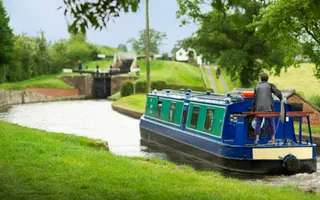What causes a boat to sink?
One of the most likely reasons is a problem with the weed hatch, usually when it hasn't been secured properly. When water comes through the weed hatch, it gets into the engine bay and your boat can sink remarkably quickly.
Another common cause of sinking is getting 'hung up' in a lock, either by 'cilling' the boat (the stern resting on the cill and tipping the boat) or getting something trapped in the gate, such as the rudder.
A less common cause of hang-ups is navigating locks with fenders dangling down the side, or forward and aft fenders either being in poor condition or not suitable.
What are other sinking hazards?
Other hazards which could lead to sinking include navigating in flood conditions (red boards), which is never recommended, and ignoring danger signage (especially 'don't moor here' signs), which are usually placed in front of underwater obstructions, ledges and sluice intakes.
In a collision, either with another boat or waterway infrastructure, plastic and wooden craft are more prone to sinking, but some metal boats may have very thin hulls too.
How can I prevention my boat from sinking?
Constant vigilance and making sure your crew are properly briefed will help prevent mistakes that could result in sinking.
Most importantly:
- Check the weed hatch is properly closed every time you go boating and every time you clear the propeller.
- Keep your boat well away from the cill when working through a lock and keep an eye out for fenders or anything else getting wedged as you ascend and descend. Make sure your crew are ready to jump into action, closing paddles quickly if things start to go wrong.
- Don't navigate in dangerous conditions or at high speeds, as both are likely to end in a collision with either another boat or a structure such as a bridge.
- Never ignore warning signs about weirs and underwater obstructions.





